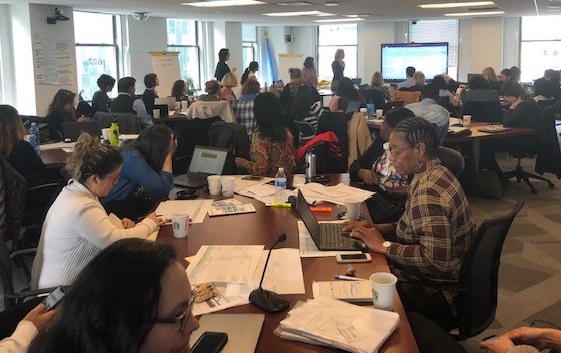First published on 04/12/2019, and last updated on 07/20/2022
By Vivienne Solis Rivera, ICCA Consortium Council Member with special responsibility for ICCAs and gender issues and CoopeSolidar
From April 11-12th, the expert workshop “Towards a gender-responsive post-2020 Global Biodiversity Framework”, organized by the Convention on Biological Diversity took place at the headquarters of United Nations – Women.
The meeting gathered close to 50 women with different backgrounds and expertise in gender and biodiversity conservation and management. Vivienne Solis Rivera, ICCA Consortium Council member with special responsibility for ICCAs and gender issues, represented the ICCA Consortium and our recently approved Gender policy.
The United Nations Convention on Biological Diversity (UN-CBD) is preparing its new decade of objectives: 2020-2030, better known as the “post 2020 – Global Biodiversity Framework”, and the ICCA Consortium is actively participating in its elaboration, through regional and thematic consultations. This expert workshop was one of them.
Its main outcome is a report that provides key messages and recommendations to tackle gender issues in the post-2020 Global Biodiversity Framework, for dissemination to Parties and other stakeholders. The report will be an input to:
- the submissions made by Parties and observers to the CBD on the preparatory process for the post-2020 Global Biodiversity Framework;
- the sub-regional, regional and global consultations on, and negotiations of, the post-2020 Global Biodiversity Framework scheduled for 2019-2020; and
- the CBD Secretariat’s post-2020 discussion paper for consideration of the post-2020 Global Biodiversity Framework.
The meeting started with a contextualization. After several group consultations, the final document and agenda will be completed for approval in July 2020.
Tanya McGregor, Coordinator of Gender issues from the CBD, mentioned the importance of providing information and guidance on this issue as gender considerations are fundamental for biodiversity conservation and sustainable use. It is important to mainstream gender into the National Biodiversity Strategies and Action Plans (NBSAP) and improve the way gender is integrated into national reports, since 67% of them do not include a specific reference to gender.
The CBD Gender Plan of Action was developed in 2008 and more than 60 CBD decisions have had a reference to women since 2006, even though they do not have specific actions suggested. Aichi Target 14 mentions women in restoration and ecosystem approaches. There is also a need to improve the link between the CBD and the Sustainable Development Goals (SDG) in gender considerations and interests. There are clear links to gender in several SDGs. Indeed, out of 232 indicators for the SDGs, 80 are gender relevant indicators.
The plenary participants were then divided into groups, with the following themes:
- Forestry and ecosystem restoration
- Conservation approaches
- Agro biodiversity and Fisheries
- Genetic diversity and Indigenous, local community and rural women
Recognition of tenure rights and the just and equitable distribution of benefits were specifically discussed. The need to move to transformational systems of change was acknowledged: lands, forest and oceans are not just commodities.
The human rights perspective on conservation was discussed, as well as the three dimensions of equity: recognition, procedure and distribution.
Delfin Ganapin (WWF-International and ICCA Consortium Honorary member) emphasized the importance of recognizing the high percentage of healthy ICCAs – Territories of Life.
Thingreiphi Lugharmar from the Naga Women Union presented the indigenous women’s perspectives. She mentioned the most important issues:
- threats from extractive industries and the risk to environmental biodiversity defenders
- continuing militarization
- degradation of ecosystems and changing landscape
- criminalization of traditional occupations
- limited access to credit.
She added that they, as indigenous women, see the solution as getting the exclusivity of traditional institutional governance over the territories and being free from militarization. She concluded that social change requires time.
The meeting ended with the statement of a strong and important target for 2030: “By 2030, assure that women and girls are taking on effective stewardship and are equitably benefiting from biodiversity and environmental services.”

